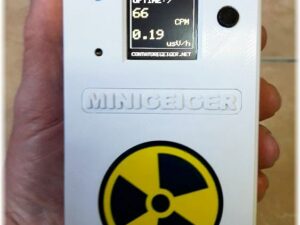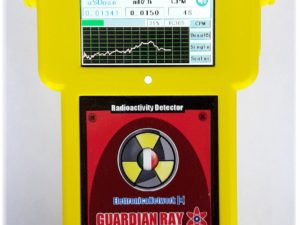The Natural Radioactivity of Matter
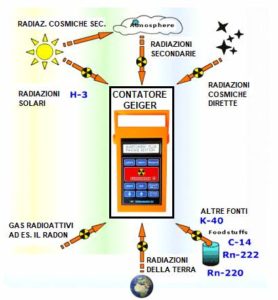
Natural radioactivity is found practically everywhere on earth and originates from various components. A first reason is represented by the different radionuclides that are present in various quantities in the planet's matter such as rocks and minerals.
The second contribution is given by solar activity and cosmic rays that hit us from the depths of the universe. The set of all these sources therefore constitutes the so-called natural background which can also be easily measured with the Geiger counter
Cos'è la Radioattività
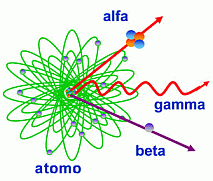
Radioactivity is the transfer of energy by an atomic nucleus of an unstable element in the form of charged particles.
For example, the energy emitted can be gamma photons, that is, very high frequency electromagnetic waves, or charged particles of mass such as electrons, that is, the so-called beta and heavy rays” helium nuclei (alpha rays).
Radioactivity is basically the effect of ionizing radiation, represented by accelerated particles that can directly or indirectly produce ionizing actions in the matter with which they interact.
The so-called cosmic rays are no exception, very energetic particles that continuously rain into the Earth's atmosphere at speeds close to that of light.
Radioactivity originating from terrestrial matter
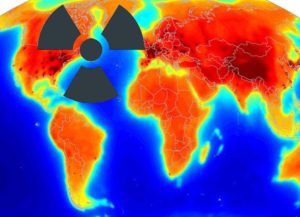
The main primordial radionuclides are potassium 40 (K-40), rubidium 87 (Rb-87), L’uranio 238 (U-238), and thorium 232 (Th-232).
The concentration of these natural radionuclides in the soil and rocks varies significantly according to the geological conformation of the different geological areas.
In general, igneous rocks and granites have traces of Uranium 238 in higher concentrations than sedimentary rocks such as limestone and chalk.. However, some of marine origin may contain this radionuclide in fairly high concentrations.
Uranium, and thorium, they are generally more present in acidic rocks than in basic ones. Typical activity concentration values in the soil are generally between 100 and 700 Becquel.kg-1 for potassium 40, tra 10 e 50 Becquel.kg-1 per i radionuclidi delle serie dell’Uranio 238 e del Torio-232.
La Radioattività naturale nell'aria

In aria, natural radiation is mainly caused by the presence of radon and toron, that is, radioactive gases that are over seven times heavier than air itself. These belong to the uranium and thorium families. The decay of Uranium 238 in fact it leads to the formation of Radon 226. Then the atomic nucleus of Rn-226 emits an alpha particle and decays into Radon-222, that is, in the common Radon gas.
If instead we consider the Thorium family, the decay of Radon 224 will lead to the formation of Radon-220, a radioactive gas called Toron.
However, radon-222 is 20 times more important than radon-220. The major contribution for the calculation of the absorbed dose comes from the children of radon and in particular from its inhalation Closed places.
La Radioattività naturale nell'acqua
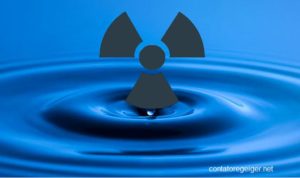
In the waters of planet earth there is a certain amount of radioactivity originating from the rains that pour radioactive substances dispersed into the air, and from the waters of natural streams which convey radioactive substances from rocks and soil into accumulation basins.
The hot and sulphurous waters of the thermal plants are significantly radioactive, generally used by humans to produce electricity and heat buildings.
Cosmic radiation
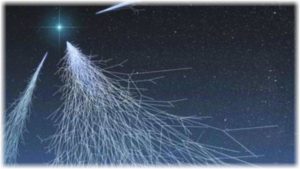
Cosmic rays originate in deep space and consist mainly of positively charged particles such as protons and heavy nuclei, which luckily for us when they arrive close to the ground, they are largely deflected by the repulsive action of the Earth's magnetic field.
A component that originates in the sun due to its nuclear explosions must also be considered, this consists mainly of protons.
The interaction of these high-energy particles with the Earth's atmosphere generates the emission of numerous secondary elements such as mesons, electrons, photons, protons and neutrons ,which in turn can create further particles.
Most primary cosmic rays are absorbed in the uppermost layer of the atmosphere, while the earth mainly receives secondary cosmic rays which are made up of mesons, electrons, photons, neutrons and protons.
In the terrestrial poles the contribution of the radioactive dose caused by cosmic rays is greater than in the equatorial areas where the earth's magnetic field effectively deflects the radiation.
The interaction of cosmic radiation with matter produces a large number of radionuclides. Among these, the highest doses for biological organisms are provided by Carbon 14 and H-3 because they are generally introduced into the human body through the food chain.
The best Geiger counters made in Italy, True Italian excellence.

MINIGEIGER 7317 handheld Geiger counter with Pancake probe
€989,00 – €1.700,00Select options This product has multiple variants. The options may be chosen on the product page
Economical Geiger Counter FNIRSI GC-01 Improved
€289,00Select options This product has multiple variants. The options may be chosen on the product page
Guardian Ray Smart 2.8p Professional Geiger Counter with WiFi, Bluetooth, microSD, Touch Color LCD and Pancake probe.
€1.299,00Add to cart- Sale!

Micro Geiger – Contatore Geiger per Smartphone Android
€350,00Original price was: €350,00.€330,00Current price is: €330,00.Add to cart
Leave a Reply Cancel reply
You must be logged in to post a comment.

